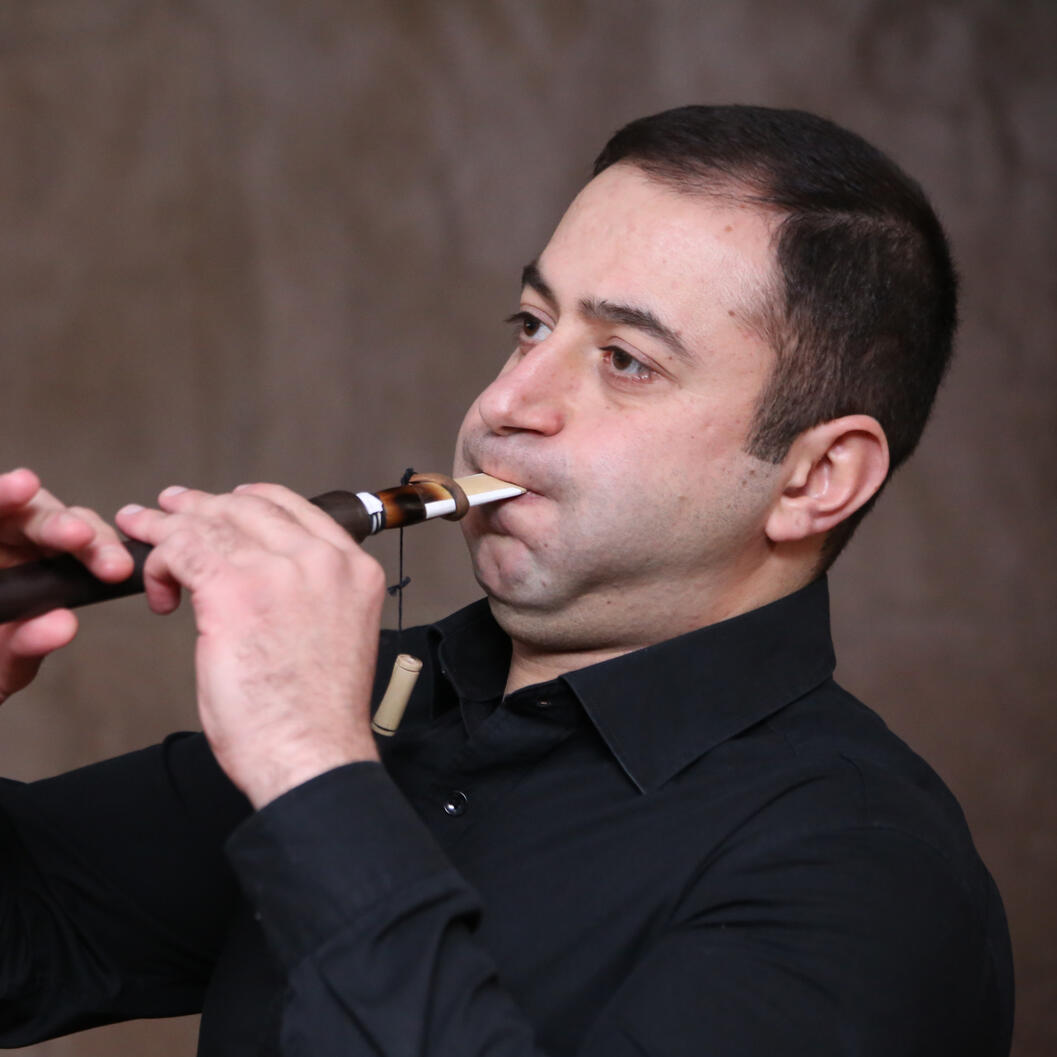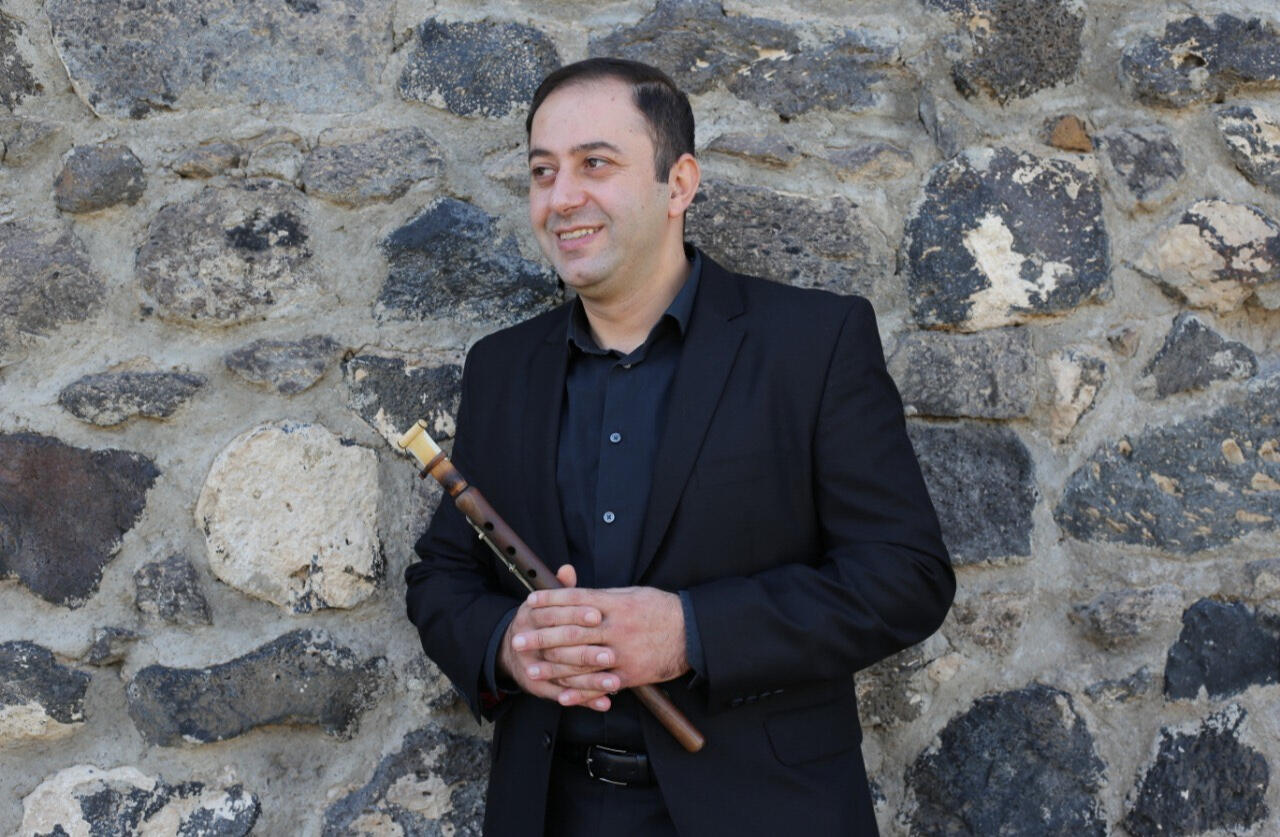
Armenian Duduk Player
Artak Asatryan
Master duduk player revolutionizing the ancient Armenian instrument for modern audiences. Through groundbreaking classical adaptations and sacred music collaborations, Artak brings 1,000 years of Armenian musical heritage to concert stages worldwide.
From Armenian folk to global stages
Duduk Goes Classical
Artak Asatryan has spent three decades expanding what's possible on the duduk, becoming the first musician to perform classical pieces by composers like Bach and Mozart on this traditional Armenian instrument. Through his work with orchestras and ensembles, he's brought the soulful sound of the duduk from Armenian folk traditions to concert stages around the world.

Duduk Sings
The Apricot Tree
Explore Artak's collection of golden Armenian duduk standards, featuring the most beloved and timeless pieces in the duduk repertoire. These classic performances showcase the instrument's soul-stirring voice through Armenia's most treasured musical traditions.
See the duduk's expressive power in live performances and recordings
Live Performances
Watch Artak bring the duduk to life in intimate recitals and grand concert hall performances. His dynamic playing style, often compared to the human voice, creates an immediate connection with audiences as he seamlessly moves between haunting Armenian folk melodies and surprising classical interpretations.
Bring the voice of the duduk to your venue or event
Book Artak
Available for solo recitals, orchestra collaborations, and chamber ensemble performances worldwide. Whether you're planning an intimate concert, cultural festival, or educational program, Artak brings three decades of expertise and a repertoire spanning from ancient Armenian traditions to classical masterpieces. Contact Artak directly to discuss your event and experience the unique voice of the duduk live.
Bio
Artak Asatryan has revolutionized the ancient art of duduk playing, transforming a traditional folk instrument into a vehicle for classical and contemporary expression. As an award-winning musician, artistic director, university lecturer, and baritone singer, he has become a pivotal figure in the development and global recognition of the duduk over three decades of performance and two decades of teaching.
The duduk, carved from apricot wood ("tsirani" in Armenian) - Armenia's national symbol - produces a melancholic timbre that captures the soul of Armenian music like no other instrument. Artak possesses one of Armenia's most exceptional duduk timbres, with a dynamic performance style that mirrors the human voice. This vocal quality has made him particularly sought after for choir and chamber orchestra collaborations, where the duduk's voice-like resonance creates seamless musical conversations.
Born in Yerevan in 1985, Artak's musical journey began at age six when he first picked up the duduk. By nine, his extraordinary talent was already evident as he joined the Folk Instruments Ensemble of the Armenian Children Philharmonic as first duduk player and soloist. This early recognition set the stage for a career that would span continents and break artistic boundaries.
Education, Ensemble, Tours, Releases and Achievements
In 2000 Artak Asatryan began his studies at the "Musical College after Romanos Melikyan" in Yerevan with Georgi Minasyan (Minasov) with whom he began to collaborate in the "Dudukner" quartet. From 2006 to 2011 he continued his studies at the "Yerevan State Conservatory after Komitas" where he started to collaborate with the composer Grigor Arakelyan. Since 2006 Asatryan has been an integral part of the Armenian Medieval Ensemble "Oshakan" and the "Oshakan Quintet" led by Grigor Arakelyan.
In 2012 he founded the "Tsirani Ensemble", a quintet interpreting ancient Armenian music in a modern way who released their debut album "Tsirani Vol. 1" in 2016. Artak is the soloist and artistic director of the internationally successful quintet. As a solo duduk player, as well as with his ensembles and orchestras, Artak Asatryan has been touring in various countries (France, Russia, Germany, Belgium, the US, India, Italy, Poland, Lebanon) He received many awards from competitions and festivals, including the Golden Ferry International Music Festival and Djivan Gasparyan's Duduk Festival.
In 2011 Artak Asatryan released his first album "Apricot Tree" with his interpretations of Armenian folk, famous poems and Komitas songs, spiritual and medieval Armenian songs. (One of these songs - Grigor Narekatsi's "Havik" was performed with duduk for the first time.) The album was re-released in 2016. From 2007 to 2018 he worked in the State Ensemble of Ashugh and Folk Song of Armenia as the first duduk and soloist. (The group has had more than 300 concerts in Armenia and performed at the Days of Armenian Culture in China, Russia and Lebanon.) He has been working at the Romanos Melikyan Music College as a duduk teacher since 2008 and at the Arno Babajanyan Music Pedagogical College since 2010.
Artistic Vision
Artak's most significant contribution to music lies in his revolutionary expansion of the duduk's repertoire and artistic possibilities. He shattered the conventional wisdom that the duduk was limited to traditional folk music by becoming the first artist to successfully adapt and perform classical masterpieces on the instrument. From Bach to Brahms, Mozart to Rachmaninov, Artak has brought the world's greatest classical and romantic compositions to life through the duduk's distinctive voice. His classical adaptations include works by Bach, Mozart, Schubert, Vivaldi, Rachmaninov, and Armenian masters Arno Babajanyan, Aram Khachaturyan, and Alexander Spendiaryan. Many of these pieces had never been performed on duduk before Artak's groundbreaking interpretations, and several remain exclusively in his repertoire to this day.
Masterworks with Grigor Arakelyan
Artak's ongoing collaboration with composer Grigor Arakelyan has produced several landmark compositions that showcase the duduk's versatility in contemporary classical settings. Their Suite Concertante for Duduk and Orchestra represents a watershed moment, establishing the duduk as a legitimate solo concert instrument capable of carrying complex orchestral works.
Their exploration of ancient Armenian spirituality through contemporary classical forms has yielded two profound works based on the sacred poetry of 10th-century mystic Grigor Narekatsi. "Ode for the Holy Virgin" (Աչքն ծով) and "Jewel Rose" (Գոհար վարդ) are arranged for duduk with chamber orchestra or chamber choir, demonstrating the instrument's remarkable capacity for expressing both spiritual contemplation and emotional depth.
Armenian Musical Heritage
Artak has undertaken the monumental task of adapting over 50 Komitas songs and more than 30 choral compositions for duduk performance. His Komitas Series (Կոմիտաս Շարք) features beloved Armenian folk songs including "Ervum em," "Yar jan ari," "Esor urbat," and "Jur kuga," arranged for duduk and chamber orchestra. These arrangements successfully transplant cherished folk melodies from intimate village settings to the concert hall while preserving their essential emotional character.Beyond Komitas, Artak has arranged four poems by Grigor Narekatsi for duduk, three of which have been performed exclusively by him, further cementing his role as a guardian and innovator of Armenia's musical heritage.
Looking Forward
Today, Artak continues to expand the boundaries of duduk artistry while honoring its ancient roots. His vision encompasses performing Armenia's vast legacy of choral compositions by masters such as Komitas, Makar Yekmalyan, and Kara-Murz in collaboration with choirs and chamber orchestras, bringing these treasures to global audiences.
Currently, Artak is completing his first book, "Duduk Dances and 7 Songs," a comprehensive analytical work designed to help advanced duduk players master the instrument's subtleties and expressive possibilities. This educational contribution ensures that his innovations and insights will inspire future generations of duduk artists.
Through his performances, teaching, and compositions, Artak Asatryan has transformed the duduk from a regional folk instrument into a voice capable of expressing the full spectrum of human emotion across all musical genres. His work represents not just technical mastery, but a profound understanding of how ancient instruments can speak to contemporary hearts while preserving their essential cultural identity. In Artak's hands, the duduk has found its place not only in Armenian tradition, but in the broader conversation of world music, carrying the soul of Armenia to concert halls across the globe.